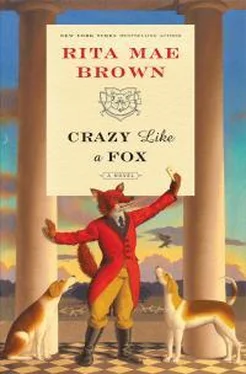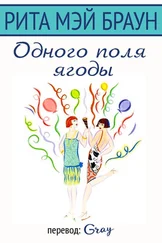Sister thought. “Except he’s not red-handed. The jewelry and watch are his.”
“He doesn’t know we know.” Shaker added this.
“You’re right there.” Sister appreciated his thoughts.
“Why did he make that damned video? Why does he blow the horn at our hunts, at the end? He’s my echo.” Shaker shook his head in puzzlement.
“Maybe that deep, mellow call is meant for someone else.” She inhaled deeply. “If we knew that, I think we’d have this solved. Weevil hasn’t hurt anyone. He might have frightened them, but he hasn’t laid a hand on anyone, other than the marijuana farmer, who had it coming. Margaret is gone. I would think he would want what she left for him. It was a big love.”
Tootie placed the ladder on Shaker’s shoulder as they walked toward the main office. “How can he be here for revenge? They’re all dead. Maybe he’s here for vindication.”
Shaker kept walking and said, “She has a point. The DuCharmes accused Weevil of stealing jewelry. They never said it was her own jewelry, but he was marked as a thief. But she’s right, too. They’re all dead.”
“Including him,” Sister added. “Perhaps.”
“The man who saved me was as alive as we are.” Tootie spoke with firmness. “He was forceful. He was looking out for me. I don’t know how he knew to be there—or maybe he was back there all along—but he was a good man. I can understand why Margaret, even though married, fell in love with him.”
Sister stopped as Shaker placed the ladder in the broom closet. “Right. We can assume he wants her gift but there’s something else. Something painful.”
“Isn’t this painful enough?” Tootie wondered.
Sister’s alto voice carried emotion. “Rips your heart out but there is something else. I feel it. I can’t find it but I truly feel there is more.”
Shaker closed the closet door. “Boss, what I feel is that we will find out. How, I don’t know.”
She nodded. “Obviously, we keep this to ourselves—for now, anyway. Like you, Shaker, I believe we will find out the whole story, and I think it will be devastating.”
CHAPTER 28
The clatter of hooves in the covered bridge at After All reverberated. Sister thought each time they rode through the red painted bridge that this is what their ancestors heard, the sounds common in the past. Now few covered bridges remained, although some people did build them on their estates. Romance lingers in a covered bridge.
A good fifty-two or -three people, in their best ratcatcher, as it was Saturday, October 14, walked through. Hounds on the east side of the bridge, the house side, already began working Broad Creek moving north.
Tootie remained on the left bank of the creek while Betty Franklin covered the right.
Dew glittered on the deep green grass, on the few leaves that had already fallen. The temperature would lift in twenty minutes as the mercury was rising. A robin’s-egg-blue sky, never helpful as it meant a high pressure system, filled with a few creamy cumulus clouds, added to the beauty. However, just because it was high pressure didn’t mean hounds wouldn’t find scent. The temperature, nudging just over 40°F, would help; drawing along the creek would also help. Often little wind tunnels blew over creeks, the moisture carrying scent.
The field, jammed with the regulars, added to the excitement of the day. Kasmir and Alida rode together. Tedi and Edward rode right behind Sister, as this was their property and they were the oldest riding members of the hunt. Bobby Franklin shepherded Second Flight. Cindy Chandler, Foxglove’s owner, sat on Booper, who looked at everything. Booper wanted to hear hound music. Walter Lungrun, Ben Sidell, Freddie Thomas, visiting for the day, Monica Greenberg—sidesaddle, as always—and Amy Burke—also sidesaddle—dazzled everyone.
Yvonne and Aunt Daniella rode in Gray’s Land Cruiser. Each time Yvonne beheld the smartness of cubbing hunting kit, she became more determined to ride. Cubbing allowed more individual expression in attire. She couldn’t wait to put her list together. She knew it would take years before she earned her colors but her clothing, formal or informal, would be bespoke, her boots made just for her, and she would wear a derby, perhaps with a veil rolled up on the ribbon. She’d tapped the inside of a derby and found out it was hard, as hard as a hunt cap. Tootie told her it depended on the derby, just as it depended on the hunt cap. She also inflamed her mother’s desire by telling her that when she earned her colors she would be entitled to wear a shadbelly: tails. That did it. Tails and a top hat. And perhaps just the lightest touch of lipstick, for a lady should not be made up in the hunt field. This did not prevent “the girls” from their mascara and a hint of blusher. Hairnets contained long hair and some ladies, in a derby, wore an elegant bun just outside the hat.
The men pretended not to be too aware of fashion, but every single one riding this October morning wore a tweed or light tan jacket, cut to perfection, drawing the eye to those broad shoulders. Their britches were also tan; a few rode in brick britches. The true hard-to-find mustard britches were usually saved for formal hunting, and at that time if he had his colors he wore white britches. Each man wore his butcher boots, no tan tops. The coats carried the subtle colors of the tweed or windowpane stripes. The boot color was in synch with the coat colors. Dark brown, peanut brittle, plain black, or an elegant oxblood/maroon, boots reflected a brown tweed, a blue tweed, or a jacket with a burgundy windowpane. A man’s shirt might be pink, white, light blue, or an egg crème, with a tie that echoed something in his tweed coat. His cap would be brown if the boots were brown, black if the boots were black or oxblood. And, of course, he was nonchalant about it. Getting the harmony between cap, boots, and jacket took concentration. Over the years it became second nature.
Even if a woman was wildly in love with the man in her life, she couldn’t help but breathe deeply upon observing the smartly turned-out men.
Sometimes Sister thought the entire point of men foxhunting was to weaken women. She and Betty would giggle about it, and they supposed a lady riding sidesaddle weakened the men. The point was foxhunting was extravagantly heterosexual regardless of one’s sexual proclivities. It was one of the few venues where straight men competed with gay men for who was the best dressed.
Hounds checked a large tree log alongside the creek. Sister turned to examine The Jefferson Hunt field. How splendid they looked, how shiny their horses. She was not a bragging woman, but she was extremely proud of the field and the condition of the foxhounds. Coats gleaming, fluid movement off the shoulder, bright eyes, and such happiness she loved being part of them. She greeted most of them when they left their mothers’ wombs. What is it about watching an animal or human grow, mature, fulfill its destiny?
Once in a discussion years ago with Ray, he said, “Destiny is slavery.” Without rancor, that discussion continued for years.
The last of the field left the bridge. No more clop clop.
Noses down, hounds worked that log. Someone had walked over it hours ago.
Giorgio swore, “Aunt Netty. Has to be the biggest crab in Virginia.”
Angle, only his second time at After All, as young entry, wondered, “Who is Aunt Netty?”
Dreamboat laughed. “We’d be here all day but I can tell you, old as she is that girl can run.”
Zandy added, “She also ran off her husband, Uncle Yancy. She’s a neat freak.”
“Uncle Yancy had a relaxed attitude about order.” Diana kept pushing.
Dreamboat joined her. “Heating up a little.”
Читать дальше












